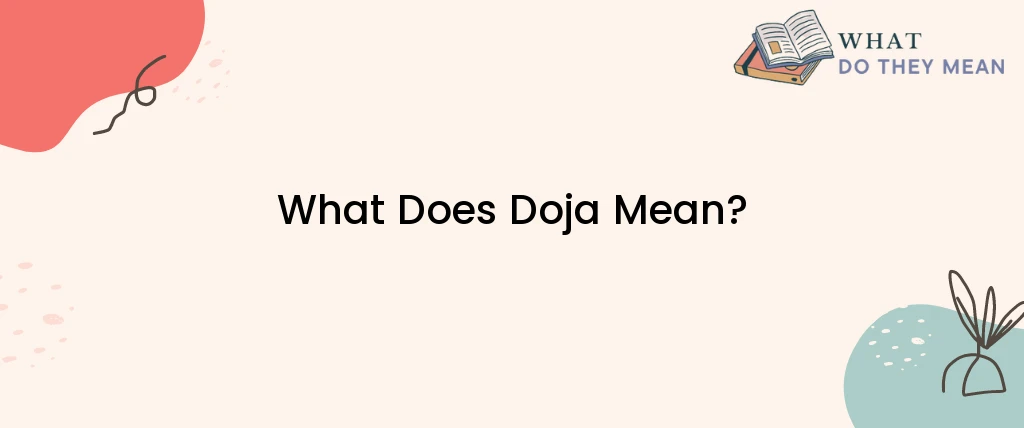“Doja” is a slang term for cannabis or marijuana. It is derived from the word “dojah” or “doobie,” which is another name for a joint or a rolled-up marijuana cigarette. The use of marijuana has been a topic of debate for decades, with some people viewing it as a harmless recreational drug while others see it as a harmful substance that should be banned. One of the slang terms associated with marijuana is “Doja.” This term has gained popularity among marijuana enthusiasts and has even made its way into popular culture. In this article, we will explore what “Doja” means, its origin, and its usage.
What is Doja?
“Doja” is a slang term that is commonly used to refer to marijuana. The term is believed to have originated from the West Coast of the United States, where marijuana use is prevalent. Over time, the term has become widely used among marijuana users and has become part of marijuana culture.
The Origin of Doja
The exact origin of the term “Doja” is unclear, but it is believed to have originated from the word “doobie.” A doobie is a term used to refer to a joint or a rolled-up marijuana cigarette. The word “doobie” is thought to have been derived from the Latin word “dubius,” meaning doubtful or uncertain.
Another theory suggests that the term “Doja” originated from the Jamaican patois word “dutty,” which means dirty. The word was used to refer to marijuana, which was considered a dirty drug by some people. The word “dutty” was later changed to “Doja” by the Rastafarian community, who used the term to refer to marijuana as a holy sacrament.
Doja in Pop Culture
The term “Doja” has become a popular reference in pop culture, particularly in music. Many musicians have referenced the term in their songs, including Snoop Dogg, Wiz Khalifa, and Doja Cat, who derived her stage name from the term.
One of the most famous references to “Doja” is in the song “Gin and Juice” by Snoop Dogg. In the song, Snoop Dogg raps, “Rollin’ down the street, smokin’ indo, sippin’ on gin and juice. Laid back (with my mind on my money and my money on my mind).”
Doja and the Law
Marijuana use is illegal in many countries around the world, including the United States. In the United States, the use of marijuana is illegal under federal law, although many states have legalized its use for medical and recreational purposes.
The use of the term “Doja” in the context of marijuana is considered slang and does not have any legal implications. However, possessing, selling, or distributing marijuana is illegal and can result in legal consequences.
Doja and Health
Marijuana use can have both positive and negative health effects. The positive effects include pain relief, reduced nausea, and increased appetite. The negative effects include impaired memory and concentration, paranoia, and increased heart rate.
The health effects of marijuana use can vary depending on the frequency and method of use, as well as the individual’s age, gender, and overall health.
Conclusion
In conclusion, “Doja” is a slang term that is commonly used to refer to marijuana. The origin of the term is unclear, but it is believed to have originated from the word “doobie” or the Jamaican patois word “dutty.” The term has become popular in pop culture and has been referenced in music by many artists. While the use of the term is slang and does not have any legal implications, the possession, sale, or distribution of marijuana is illegal and can result in legal consequences. It’s important It’s essential to understand the health effects of marijuana use, as it can have both positive and negative impacts. Individuals should also be aware of the legal implications of using marijuana in their respective jurisdictions.
Finally, it’s crucial to note that the use of marijuana is a personal choice, and individuals should make informed decisions based on their own circumstances and preferences. It’s always recommended to consult with a medical professional before using marijuana, especially if the individual has pre-existing health conditions or is taking any medications.

As a researcher, I am curious and driven by the pursuit of knowledge. I approach my work with a critical eye, carefully evaluating sources and methods to ensure that my findings are accurate and reliable. Whether delving into scientific studies, historical records, or cutting-edge technologies, I am always seeking to expand my understanding and make new discoveries. I am dedicated to uncovering new insights and finding solutions to complex problems, and am driven by a passion for uncovering the truth.

